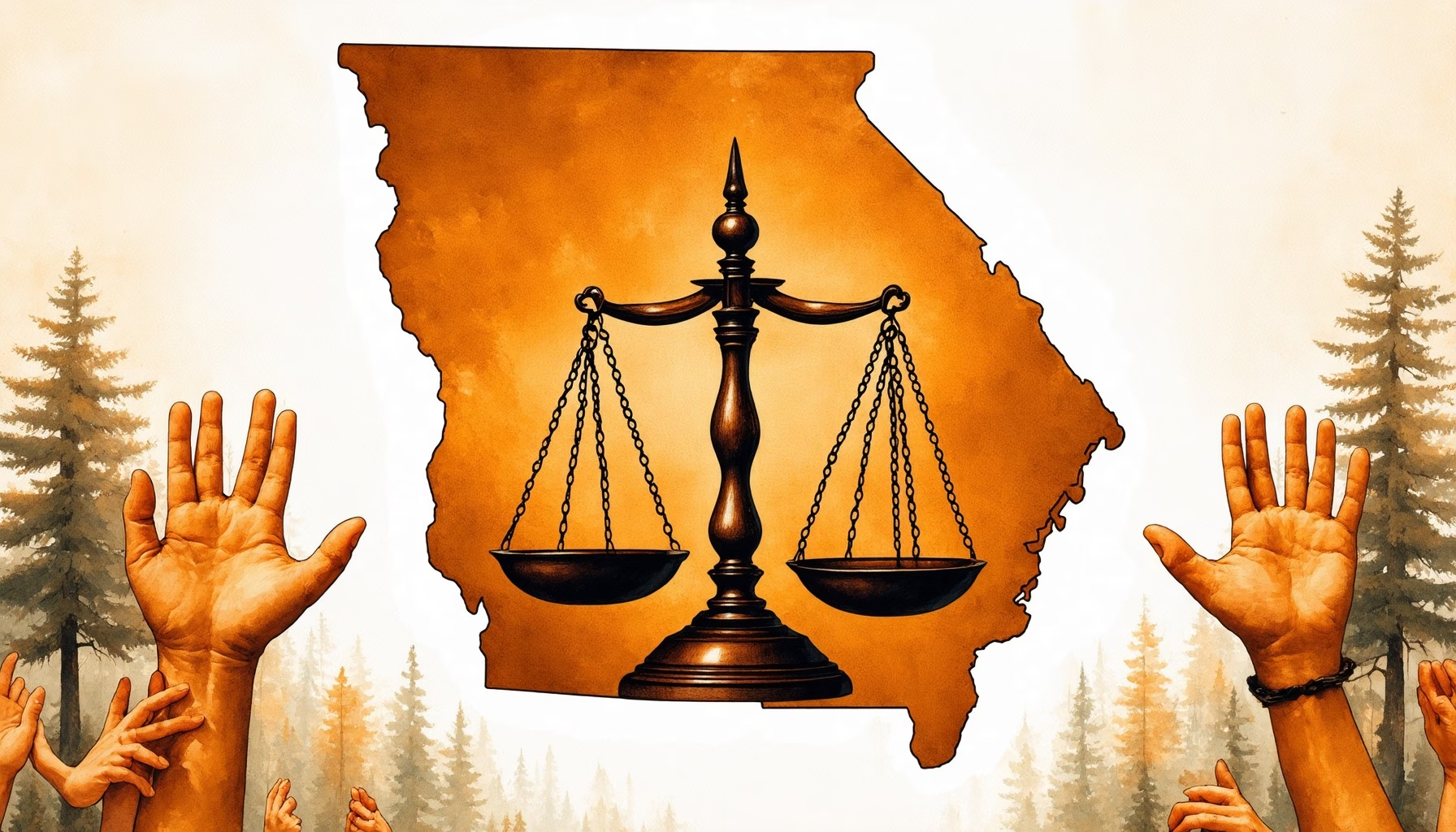Key Takeaways
- Understand income qualifications for legal aid in Georgia, typically based on Federal Poverty Guidelines, to determine your eligibility.
- Access various legal services, including civil legal assistance and pro bono programs, through organizations like Georgia Legal Aid and Atlanta Legal Aid.
- Utilize online resources and local bar associations for affordable legal representation if you cannot afford a lawyer.
- Contact Georgia Legal Aid for 24/7 free legal advice and guidance tailored to your specific legal needs.
- Prepare necessary documentation, such as proof of income, to apply for legal aid services effectively and efficiently.
In the complex landscape of legal support in Georgia, understanding the resources available can be a daunting task. This article, titled Navigating Legal Support in Georgia: Essential Insights on georgialegalaid org, Income Qualifications, and Pro Bono Services, aims to demystify the process of accessing legal aid through georgialegalaid.org. We will explore critical topics such as the maximum income thresholds to qualify for legal aid, the various programs and services offered, and how to find affordable legal representation if you cannot afford a lawyer. Additionally, we will delve into the world of pro bono services, detailing how organizations like Atlanta Legal Aid provide essential support at no cost. For those in urgent need, we will also outline how to access free legal advice 24/7 and the documentation required for legal aid applications. By the end of this article, you will have a comprehensive understanding of the legal aid landscape in Georgia, empowering you to navigate your legal challenges with confidence.
What is the maximum income to qualify for legal aid?
Understanding Income Qualifications for Georgia Legal Aid
To qualify for legal aid in Georgia, income thresholds are primarily based on the Federal Poverty Guidelines (FPG). Here are the key points regarding maximum income limits:
1. **125% of Federal Poverty Guidelines**: This is the most common threshold used by Legal Aid organizations funded by the Legal Services Corporation (LSC). For 2023, this translates to an annual income of approximately $17,000 for an individual and $35,000 for a family of four.
2. **200% of Federal Poverty Guidelines**: Some Legal Aid organizations may have more flexible income criteria, allowing individuals and families with incomes up to 200% of the FPG to qualify for assistance. This equates to about $27,000 for an individual and $55,000 for a family of four.
3. **Variable Income Limits**: Specific income limits can vary significantly depending on the Legal Aid organization and the type of legal case involved. Certain organizations may consider additional factors such as household size, expenses, and the nature of the legal issue.
For the most accurate and personalized information, individuals should consult their local Legal Aid office or visit the Legal Services Corporation website. Additionally, resources like Gov Guider can provide guidance on eligibility and available services. Understanding these thresholds is crucial for those seeking legal assistance, as they determine access to vital legal resources for low-income individuals and families.
Overview of Georgia Legal Aid Programs and Services
Georgia Legal Aid offers a variety of programs and services designed to assist low-income residents with legal issues. These services include:
– **Civil Legal Assistance**: Providing support for issues such as housing, family law, and public benefits.
– **Pro Bono Services**: Connecting individuals with volunteer attorneys who offer free legal representation.
– **Educational Resources**: Offering workshops and materials to help individuals understand their legal rights and navigate the legal system.
For more detailed information on the specific programs available, you can visit the [Georgia Legal Aid Services](https://govguider.com/navigating-georgia-legal-aid-services-your-guide-to-free-legal-help-income-limits-and-finding-affordable-lawyers/) page. Accessing these resources can empower individuals to take control of their legal situations and ensure they receive the assistance they need.

Where can I find a lawyer in Georgia if I can’t afford one?
If you cannot afford to hire a private attorney in Georgia, there are several options available to help you access legal assistance:
- Legal Aid Organizations: You can qualify for free or low-cost civil legal assistance through various legal aid organizations. These organizations provide services to individuals who meet specific income criteria. Notable resources include:
- Georgia Legal Services Program: This program offers free legal assistance to low-income individuals in civil matters. Visit their website for more information on eligibility and services.
- Atlanta Legal Aid Society: This organization provides legal assistance in the Atlanta area and can help with various civil legal issues.
- Pro Bono Programs: Many attorneys in Georgia participate in pro bono programs, offering their services for free to those in need. The State Bar of Georgia has a Pro Bono Project that connects individuals with volunteer attorneys. You can find more information on their website.
- Law School Clinics: Several law schools in Georgia, such as Emory University School of Law and Georgia State University College of Law, have legal clinics where law students provide free legal assistance under the supervision of licensed attorneys. These clinics often focus on specific areas of law, such as family law or immigration.
- Public Defender Services: If you are facing criminal charges and cannot afford an attorney, you have the right to a public defender. The Georgia Public Defender Council provides legal representation to individuals who qualify based on income.
- Online Resources: Websites like GeorgiaLegalAid.org offer a comprehensive directory of civil legal assistance programs and resources tailored to your specific legal needs. This site can guide you in finding the right assistance based on your situation.
Resources for Finding Affordable Legal Representation in Georgia
In addition to the organizations mentioned, there are various resources available to help you find affordable legal representation in Georgia:
- State Bar of Georgia: The State Bar provides a lawyer referral service that can connect you with attorneys who offer initial consultations at a reduced fee.
- Legal Aid Websites: Websites like Legal Services Corporation can help you find local legal aid offices that serve your area.
- Community Organizations: Many community organizations partner with legal aid services to provide assistance. Check with local nonprofits for potential legal resources.
Utilizing the Georgia Legal Aid Phone Number for Assistance
If you need immediate assistance, you can contact the Georgia Legal Aid phone number. This resource can guide you through the process of finding legal help based on your specific needs. They can provide information on eligibility, available services, and how to apply for assistance. It’s a valuable first step in accessing the legal support you require.
How Much Do Pro Bono Lawyers Charge?
Pro bono lawyers charge no fees for their services, focusing instead on providing essential legal assistance to those in need. This model ensures that individuals who cannot afford legal representation still have access to justice. Pro bono, derived from the Latin phrase meaning “for the public good,” refers to legal services provided voluntarily and without charge. These lawyers play a crucial role in addressing legal needs that would otherwise go unmet, particularly for low-income individuals and marginalized communities.
Exploring Pro Bono Services in Georgia
In Georgia, pro bono legal services are vital for those facing legal challenges without the means to hire an attorney. Various organizations and law firms participate in pro bono work, offering assistance in areas such as family law, housing disputes, immigration issues, and civil rights cases. To access these services, individuals can reach out to local legal aid organizations or bar associations, which often have programs dedicated to connecting clients with pro bono attorneys.
Key Points about Pro Bono Legal Services:
- Definition and Purpose: Pro bono work serves the public interest, ensuring that legal needs are met for those who cannot afford representation.
- Eligibility for Pro Bono Services: Eligibility is typically determined by income level, the nature of the legal issue, and resource availability within the legal community.
- Types of Cases Handled: Pro bono lawyers often take on cases involving family law, housing disputes, immigration, and civil rights.
- Finding Pro Bono Lawyers: Individuals can contact local legal aid organizations, bar associations, or law schools with pro bono programs for assistance.
- Impact of Pro Bono Work: Pro bono services promote social justice and equality, addressing unmet legal needs in the community.
The Role of Atlanta Legal Aid in Providing Free Legal Services
Atlanta Legal Aid is a key player in providing free legal services to low-income individuals in Georgia. This organization focuses on various legal issues, including housing, family law, and consumer rights. By offering pro bono services, Atlanta Legal Aid helps ensure that vulnerable populations receive the legal support they need.
Individuals seeking assistance can contact Atlanta Legal Aid directly or visit their website for more information on available services. The organization also collaborates with volunteer attorneys to expand its reach and effectiveness in serving the community.
For more resources on accessing legal aid in Georgia, you can visit Georgia legal aid services or explore free legal help resources.
How do I call 24/7 for free legal advice in Georgia?
Accessing free legal advice in Georgia is straightforward, with multiple resources available to assist you. Here are some key options to consider:
- Georgia Legal Services Program (GLSP): If you reside in any county in Georgia, you can fill out the online intake application at the GLSP website or call their helpline at 1-833-457-7529. This service helps determine if you qualify for free legal assistance based on your income and legal needs.
- Georgia Senior Legal Aid: For individuals aged 60 and over, you can reach out to Georgia Senior Legal Aid at (404) 389-9992 or toll-free at 1-888-257-9519. They provide specialized legal services tailored to seniors.
- Local Bar Associations: Many local bar associations in Georgia offer free legal clinics or referral services. You can contact your local bar association for more information on available resources.
- Legal Aid Organizations: Various nonprofit organizations in Georgia provide free legal services. Research organizations such as the Atlanta Legal Aid Society or the Georgia Alliance to End Homelessness for additional support.
- Online Resources: Websites like LawHelp.org can guide you to free legal resources and information specific to your legal issue.
Accessing Free Online Legal Advice Georgia
In addition to phone support, there are numerous online platforms where you can access free legal advice in Georgia. These platforms often provide resources, articles, and forums where you can ask questions and receive guidance from legal professionals. Some notable online resources include:
- Legal Services Corporation: This organization offers a wealth of information about legal aid services available in your area.
- Nolo Legal Resources: Nolo provides a variety of legal articles and resources that can help you understand your rights and options.
- Free Legal Help Resources: This guide outlines various ways to obtain legal assistance without cost.
Contacting Legal Aid for Immediate Support
If you require immediate legal assistance, contacting a legal aid organization directly is your best option. They can provide guidance tailored to your specific situation and help you navigate the legal system effectively. Remember to have any relevant documentation ready when you call, as this will help expedite the process of determining your eligibility for assistance.

Does Legal Aid Ask for Proof of Income?
Yes, legal aid programs typically require proof of income to assess an applicant’s financial need. This process is essential to determine eligibility for assistance. Here’s how legal aid assesses financial need:
- Documentation Required: Applicants are usually asked to provide various forms of documentation, including:
- Recent pay stubs
- Tax returns from the previous year
- Bank statements
- Documentation of any other sources of income (e.g., Social Security, unemployment benefits)
- Asset Verification: In addition to income, legal aid programs may also request information regarding the applicant’s assets, such as:
- Property ownership
- Savings accounts
- Investments
- Application Review: After submitting the application along with the required documentation, the legal aid program conducts a thorough review. This review helps determine if the applicant meets the income and asset thresholds set by the program.
- Income Guidelines: Each legal aid organization may have different income guidelines, often based on the federal poverty level. For example, many programs assist individuals and families whose income is at or below 125% of the federal poverty line.
- Confidentiality: It’s important to note that all information provided during this process is kept confidential and is used solely for the purpose of determining eligibility for legal aid services.
For more detailed information on legal aid eligibility and requirements, you can refer to resources such as the Legal Services Corporation or your local legal aid office. These organizations provide comprehensive guidelines and support for individuals seeking legal assistance.
Documentation Requirements for Georgia Legal Aid Applications
When applying for Georgia Legal Aid, it is crucial to understand the specific documentation requirements. Applicants must prepare to submit the following:
- Proof of income, including recent pay stubs and tax returns
- Bank statements reflecting current financial status
- Any relevant documentation regarding assets, such as property or investments
These documents help legal aid organizations evaluate your financial situation accurately and ensure that assistance is provided to those who truly need it. For further guidance, you can explore the Georgia legal aid services.
Understanding the Application Process for Georgia Legal Services Program
The application process for Georgia Legal Aid involves several steps to ensure that applicants receive the support they need. Here’s a brief overview:
- Initial Inquiry: Begin by contacting a local legal aid office or visiting their website to understand the services available.
- Gather Documentation: Collect all necessary documents that demonstrate your income and assets.
- Submit Application: Fill out the application form accurately and submit it along with the required documentation.
- Follow Up: After submission, follow up with the legal aid office to check on the status of your application.
By understanding these steps, you can navigate the application process more effectively and increase your chances of receiving the legal assistance you need. For additional resources, consider visiting Free legal help resources.
What is the maximum you can make to qualify for financial aid?
Understanding the financial aid eligibility criteria in Georgia is crucial for those seeking assistance. While there is no specific maximum income limit to qualify for federal financial aid, various factors play a significant role in determining eligibility. The Free Application for Federal Student Aid (FAFSA) evaluates your financial situation, including family income, assets, and household size.
Financial Aid Eligibility Criteria in Georgia
Key factors influencing financial aid eligibility include:
- Income Level: Although there is no strict cut-off, lower income levels generally enhance eligibility for need-based aid. The Expected Family Contribution (EFC) is calculated based on the financial information submitted through FAFSA.
- Family Size: The number of dependents in your household can affect your financial aid eligibility. A larger family size may increase the amount of aid you qualify for, indicating a greater financial need.
- Year in School: Your academic standing can also impact the type and amount of financial aid available. For instance, undergraduate students may have different eligibility criteria compared to graduate students.
- State and Institutional Aid: Some states and colleges have their own financial aid programs with specific income thresholds. It’s essential to check with your state’s higher education agency or your institution’s financial aid office for additional requirements.
- Special Circumstances: If you experience significant changes in your financial situation, such as job loss or medical expenses, you can appeal for a reevaluation of your financial aid eligibility.
For more detailed information, visit the Federal Student Aid website, which provides comprehensive resources on financial aid eligibility and the FAFSA process.
Comparing Legal Aid and Financial Aid Resources
When considering assistance, it’s important to differentiate between legal aid and financial aid resources. Georgia Legal Aid offers various programs aimed at providing legal support to low-income individuals, including services related to housing, family law, and public benefits. For those in need of legal assistance, exploring options through Georgia legal aid services can be beneficial.
In contrast, financial aid primarily focuses on educational funding, helping students cover tuition and related expenses. Understanding both resources can empower individuals to make informed decisions about their legal and educational needs.
Georgia Legal Aid Rental Assistance
Georgia Legal Aid offers essential support for individuals facing housing instability through various rental assistance programs. These programs are designed to help low-income families and individuals secure safe and affordable housing, particularly during times of financial hardship. Understanding how to navigate these resources can significantly impact your ability to maintain stable housing.
Navigating Rental Assistance Programs through Georgia Legal Aid
To access rental assistance through Georgia Legal Aid, it’s crucial to understand the eligibility criteria and application process. Generally, applicants must demonstrate financial need, which often includes providing proof of income and expenses. Programs may vary by county, so it’s advisable to check with local legal aid offices for specific offerings. For instance, the Georgia Legal Services Program (GLSP) provides assistance for eviction defense, housing discrimination, and other related issues. You can find more information about their services here.
Additional Resources for Housing Support in Georgia
In addition to Georgia Legal Aid, there are several other resources available for housing support. The Georgia Department of Community Affairs (DCA) offers programs aimed at preventing homelessness and providing rental assistance. Additionally, local non-profits and community organizations often have programs tailored to specific needs, such as emergency rental assistance or transitional housing. For comprehensive information on these resources, you can visit the Legal Services Corporation or the American Bar Association for further guidance on legal rights and available support.




